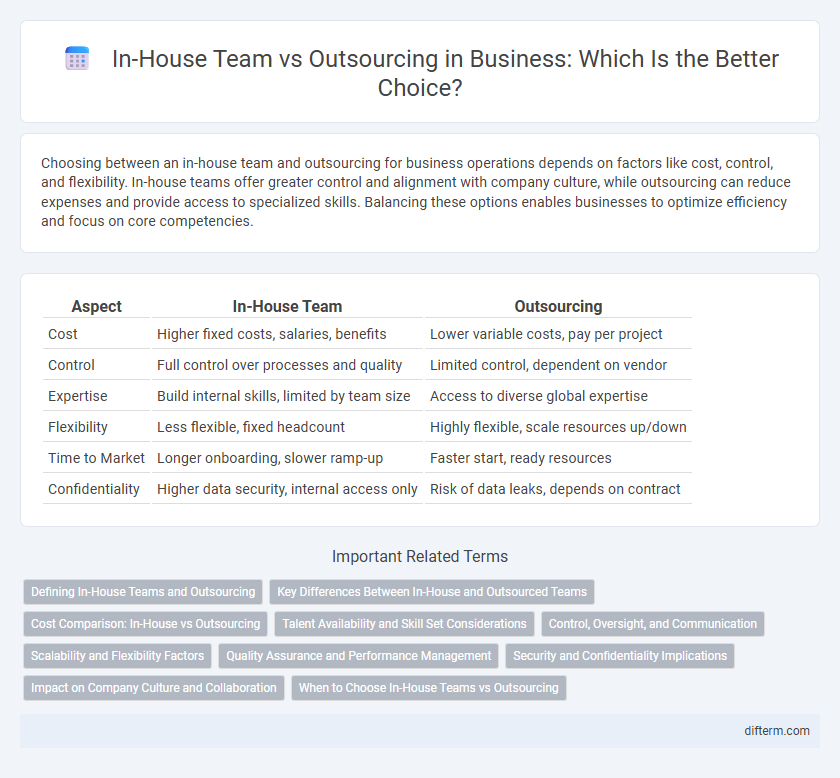Choosing between an in-house team and outsourcing for business operations depends on factors like cost, control, and flexibility. In-house teams offer greater control and alignment with company culture, while outsourcing can reduce expenses and provide access to specialized skills. Balancing these options enables businesses to optimize efficiency and focus on core competencies.
Table of Comparison
| Aspect | In-House Team | Outsourcing |
|---|---|---|
| Cost | Higher fixed costs, salaries, benefits | Lower variable costs, pay per project |
| Control | Full control over processes and quality | Limited control, dependent on vendor |
| Expertise | Build internal skills, limited by team size | Access to diverse global expertise |
| Flexibility | Less flexible, fixed headcount | Highly flexible, scale resources up/down |
| Time to Market | Longer onboarding, slower ramp-up | Faster start, ready resources |
| Confidentiality | Higher data security, internal access only | Risk of data leaks, depends on contract |
Defining In-House Teams and Outsourcing
In-house teams consist of employees directly hired and managed within a company, providing control over workflows and processes while fostering collaboration and company culture. Outsourcing involves contracting external organizations or freelancers to perform specific business functions, enabling access to specialized skills and cost savings. The decision between the two impacts operational efficiency, budget allocation, and scalability in business strategy.
Key Differences Between In-House and Outsourced Teams
In-house teams provide direct control, immediate communication, and deeper alignment with company culture, enhancing collaboration on complex projects. Outsourced teams offer cost efficiency, access to specialized skills, and scalability, making them ideal for non-core or short-term tasks. The choice depends on factors such as budget, project scope, required expertise, and desired flexibility.
Cost Comparison: In-House vs Outsourcing
In-house teams typically incur higher fixed costs, including salaries, benefits, office space, and training, leading to greater long-term financial commitment. Outsourcing offers variable costs aligned with project scope, reducing overhead and enabling access to specialized expertise without significant capital investment. Businesses often achieve cost efficiency by outsourcing non-core functions while maintaining critical operations in-house to balance control and expenditure.
Talent Availability and Skill Set Considerations
In-house teams offer direct control over talent availability, ensuring alignment with company culture and immediate access to specialized skills tailored to specific business needs. Outsourcing expands the talent pool globally, providing access to diverse skill sets and advanced expertise that may be scarce or costly to develop internally. Evaluating the balance between immediate skill requirements and long-term talent development is critical for optimizing project outcomes and operational efficiency.
Control, Oversight, and Communication
In-house teams offer superior control and direct oversight, enabling businesses to closely monitor progress and make real-time adjustments. Communication tends to be more seamless and immediate with internal staff, fostering clearer alignment with company goals. Outsourcing can introduce challenges in maintaining consistent oversight and timely communication, potentially impacting project responsiveness and quality assurance.
Scalability and Flexibility Factors
In-house teams provide deep organizational knowledge but often face limitations in scalability and flexibility due to fixed resources and longer hiring cycles. Outsourcing offers rapid scalability and adaptable resource allocation, allowing businesses to efficiently respond to market demands and project fluctuations. Companies prioritizing agility and cost-effective expansion typically benefit from leveraging outsourced talent pools.
Quality Assurance and Performance Management
In-house teams for Quality Assurance and Performance Management offer direct control, immediate collaboration, and deep company-specific knowledge that enhances product reliability and operational efficiency. Outsourcing these functions provides access to specialized expertise, scalability, and cost-effective solutions, often accelerating testing cycles and performance evaluations. Balancing both approaches strategically can optimize resource allocation, maintain high-quality standards, and improve overall business outcomes.
Security and Confidentiality Implications
In-house teams offer greater control over sensitive data, reducing risks of breaches through direct oversight and tailored security protocols. Outsourcing can introduce vulnerabilities due to third-party access and varying compliance standards, necessitating rigorous vendor risk assessments and encrypted communication channels. Companies must balance cost-efficiency with data protection by implementing strict non-disclosure agreements and continuous monitoring of outsourced operations.
Impact on Company Culture and Collaboration
In-house teams foster stronger company culture through daily face-to-face interactions, shared values, and better alignment with organizational goals. Outsourcing can create communication barriers and reduce team cohesion, potentially hindering collaboration and innovation. Maintaining consistent workflows and integrating external partners effectively is crucial to minimize disruption and support a unified company culture.
When to Choose In-House Teams vs Outsourcing
Choosing between in-house teams and outsourcing depends heavily on project scope, control requirements, and budget constraints. In-house teams excel when businesses require deep company knowledge, ongoing collaboration, and rapid iteration, especially for core competencies. Outsourcing offers flexibility, access to specialized skills, and cost efficiency, ideal for non-core projects with defined timelines and scalable resource needs.
in-house team vs outsourcing Infographic

 difterm.com
difterm.com